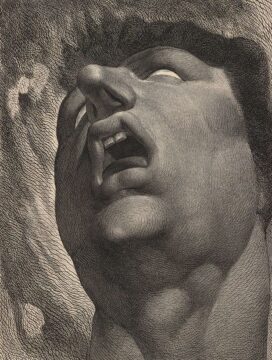by Christopher Horner
Insist on your self; never imitate. —Emerson
How can a man of consciousness have the slightest respect for himself? —Dostoevsky

The key promise of the modern world was the freedom of the individual. It was the motivating cry of the great revolutions of the modern age, meaning two things, at least: first, the removal of the external barriers to freedom: no more oppression by kings and priests, and later, freedom from the democratic masses themselves: the ‘tyranny of the majority’. Second, freedom as the ability to be oneself, to express who one truly is; the ideal of authenticity. The free, unique individual, able at last to to express their unique self. But this ‘real’ self needs to be found in order to be freed, and this has proved to be more difficult than the removal of oppressive rulers.
Authenticity
The authentic self is hard to reach. Something keeps getting in the way. Perhaps the culprit is an inauthentic self, a mask or double woven by social convention, and adopted through self deception. So one becomes two, or perhaps three. The alienated self must discard the false in order to find the True Self. The great task for moderns is to be authentic and unique.
That this should seem natural to us may be because we have been shaped by the brave new world of bourgeois freedom that followed the Age of Revolutions. Mill, Constant, de Tocqueville, Emerson, all have it for their theme, which was also that of much romantic art of the period. Here is Ralph Waldo Emerson, in his essay Self Reliance:
Whoso would be a man, must be a nonconformist. He who would gather immortal palms must not be hindered by the name of goodness, but must explore if it be goodness. Nothing is at last sacred but the integrity of our own mind. [1]
Emerson continues in this vein at some length, in a high flown peroration. He refers repeatedly to the evil effects of the crowd, the multitude the mass of men (it’s always men) who threaten to suffocate the genius of the individual. This can seem like tedious over insistence. It still finds an audience, especially in the self-help and get-ahead-in-business circles that dream of the remarkable person who achieves success, by liberating their unique self with all its talents. Read more »



 They all want it: the ‘digital economy’ runs on it, extracting it, buying and selling our attention. We are solicited to click and scroll in order to satisfy fleeting interests, anticipations of brief pleasures, information to retain or forget. Information: streams of data, images, chat: not knowledge, which is something shaped to a human purpose. They gather it, we lose it, dispersed across platforms and screens through the day and far into the night. The nervous system, bombarded by stimuli, begins to experience the stressful day and night as one long flickering all-consuming series of virtual non events.
They all want it: the ‘digital economy’ runs on it, extracting it, buying and selling our attention. We are solicited to click and scroll in order to satisfy fleeting interests, anticipations of brief pleasures, information to retain or forget. Information: streams of data, images, chat: not knowledge, which is something shaped to a human purpose. They gather it, we lose it, dispersed across platforms and screens through the day and far into the night. The nervous system, bombarded by stimuli, begins to experience the stressful day and night as one long flickering all-consuming series of virtual non events.